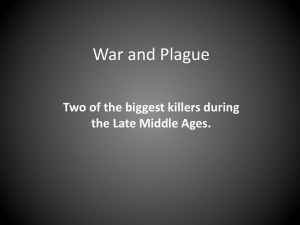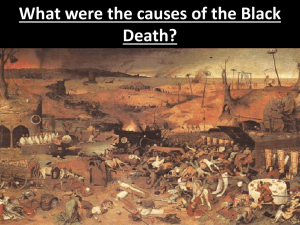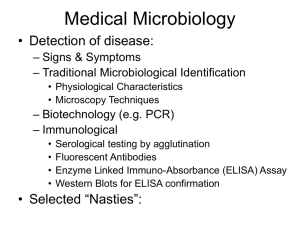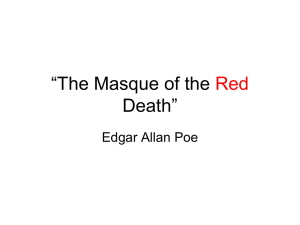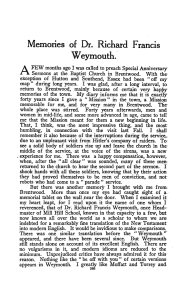The Black Death
advertisement
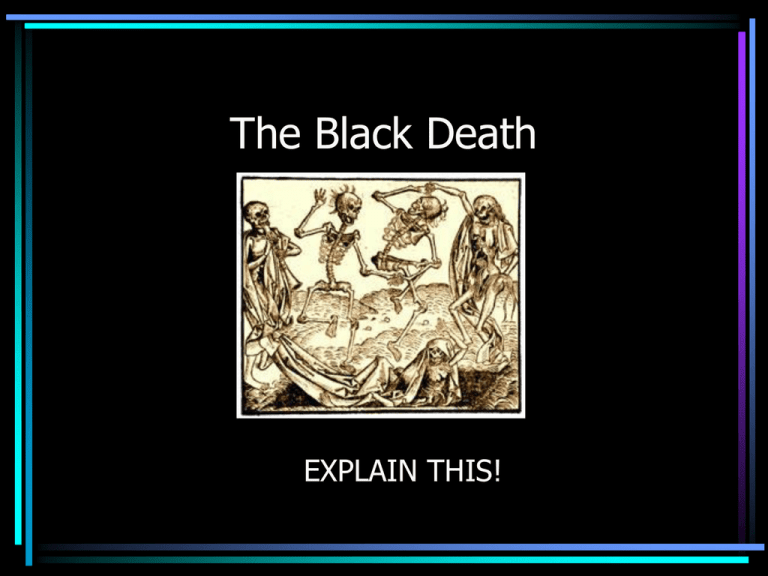
The Black Death EXPLAIN THIS! Plague Vocabulary (from video) • Black Death, also called Bubonic Plague, The Pestilence, or The Plague • Pandemic • Yersinia Pestis • Mongols, Genovese • Buboes and acral necrosis • Boccaccio • Flagellant • Amelioration of the peasants YOUTUBE: The Black Death History Teachers use Gwen Stefani’s Hollaback Girl to explain this pandemic: Oo-oo Fleas on Rats! A longer documentary: History’s Turning Points: AD 1347 The Black Death What was the Black Death? Synonyms (for research purposes) • The Plague • The Bubonic Plague • The Pestilence ___________________________ Reading from Source 1: Bishop, Morris. The Horizon Book of the Middle Ages. Toronto: McClelland and Stewart, 1968. BIG Questions: How have people explained this pandemic? How did it spread so fast and so far, so quickly? YOUR QUESTIONS: • How did people of the Medieval Times explain it? What were some of the medieval accounts? • How do Scientists explain it? • How does Social Studies (that is, Geographers and Historians) explain it? • How can Mathematicians help us to understand it? What was the Black Death? • October 1347 • 12 Italian ships returned to Messina from Russian Crimea • Sailors were dying on board • Townspeople ordered ships to leave • Residents fled, spreading Plague • Spread through Sicily to Italy & France Source 1 What was the Black Death? • Bacilli in fleas’ stomachs blocks normal feeding • Tries to feed on black rats • Infects rat with bacilli • Also feeds on humans Source 1, continued Yersinia pestis (Y. pestis) bacilli Today, some historians and doctors dispute the long-held theories about rats and fleas What is the Black Death? • Plague bacilli in human bloodstream settle in lymph glands • Result in hemorrhages in blood vessel walls • Dark patches on the skin • Tongue turns black • Swellings (buboes) under arms, in groin • Death usually in 3 days Source 1, continued Ring Around the Rosie Ring around the rosie A pocketful of posie Hush-a, hush-a We all fall down. -----------------------“ring around rosie” = skin rash Posie = flowers to fight infection Fall down = die The Black Death moved in waves … The Black Death in Dorset • June 1348: came first to England by port of Weymouth in Dorset • People left villages • Disease spread over large area of county to cities • Rats and fleas “thrived in unsanitised conditions” • Source 2 What is the Black Death? • Dirty towns with rats got the worst of it • Doctors and priests couldn’t do anything • Animals got sick too • Society changed as people left their friends, family, work, homes Source 1, continued The Black Death in Florence Life in the Towns • Crowded with people and houses • Animals roamed streets and lived with families in winter • Streets had no room, poor lighting, and sewage running down them • Animal manure and garbage were common sights – smelly • Flies, rodents, etc. • Source 3 Epidemic: The Black Death • People blamed many things: • Foul air • A look from someone who was sick • God’s anger • Lungs infected – bacteria spread with sneezing • Finally, millions died of the Black Death • Source 3: Peters Other problems … • • • • • • • • Weather turned cold Floods, early snows, late frosts. earthquakes Less fertile land, crop failures Diseased and dying animals Less food and items for keeping warm Wars Famine, sickness More rodents • Source 3: Peters Who or what to blame? • Things celestial, terrestrial, or miasmatic, that is, vaporous (*as in the foul vapours from a swamp) • Winds, swamps, lack of sun • Filth, dead bodies • Indulgence – foods, sins • Planetary movements • Cripples, nobles, Jews … • Source 4: Encyc of P & P (A) Medieval Explanations 3 •People blamed many things: foul air, a look from someone who was sick, God’s anger 4 •Things celestial, terrestrial, or miasmatic, that is, vaporous (*as in the foul vapours from a swamp) 4 •Winds, swamps, lack of sun 4 •Filth, dead bodies 4 •Indulgence – foods, sins 4 •Planetary movements 4 •Cripples, nobles, Jews … (B) Geographic Explanations 1 •October 1347: 12 Italian ships returned to Messina from Russian Crimea 1 •Spread through Sicily to Italy & France 2 •June 1348: came first to England by port of 2 Weymouth in Dorset •People left villages; disease spread over large area of county to cities •Weather turned cold 3 3 •Floods, snow, earthquakes (C) Factors of sanitation and hygeine 3 Towns were crowded 3 Sewage ran down streets; manure piled … Sources 1. 2. Bishop, Morris. The Horizon Book of the Middle Ages. Toronto: McClelland and Stewart, 1968. “The Black Death in Weymouth & Portland, Dorset.” Weymouth & Portland Borough Council. 2005. 12 Nov 2006. www.weymouth.gov.uk/main.asp?svid=769 3. 4. Peters, Stephanie True. Epidemic! The Black Death. Tarrytown, NY: Benchmark, 2005. “Black Death.” Encyclopedia of Plague and Pestilence: From Ancient Times to the Present. George Childs Kohn, Ed. New York: Checkmark, 2001. Works Cited Bishop, Morris. The Horizon Book of the Middle Ages. Toronto: McClelland and Stewart, 1968. “Black Death.” Encyclopedia of Plague and Pestilence: From Ancient Times to the Present. George Childs Kohn, Ed. New York: Checkmark, 2001. “The Black Death in Weymouth & Portland, Dorset.” Weymouth & Portland Borough Council. 2005. 12 Nov 2006. www.weymouth.gov.uk/main.asp?svid=769 Peters, Stephanie True. Epidemic! The Black Death. Tarrytown, NY: Benchmark, 2005. THE END
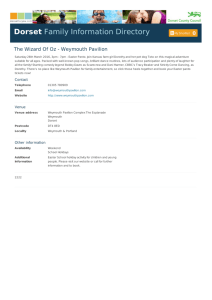
![[Presentation by Sara Morgans].](http://s2.studylib.net/store/data/005578977_1-95120715b429730785aca2fdba9a2208-300x300.png)


